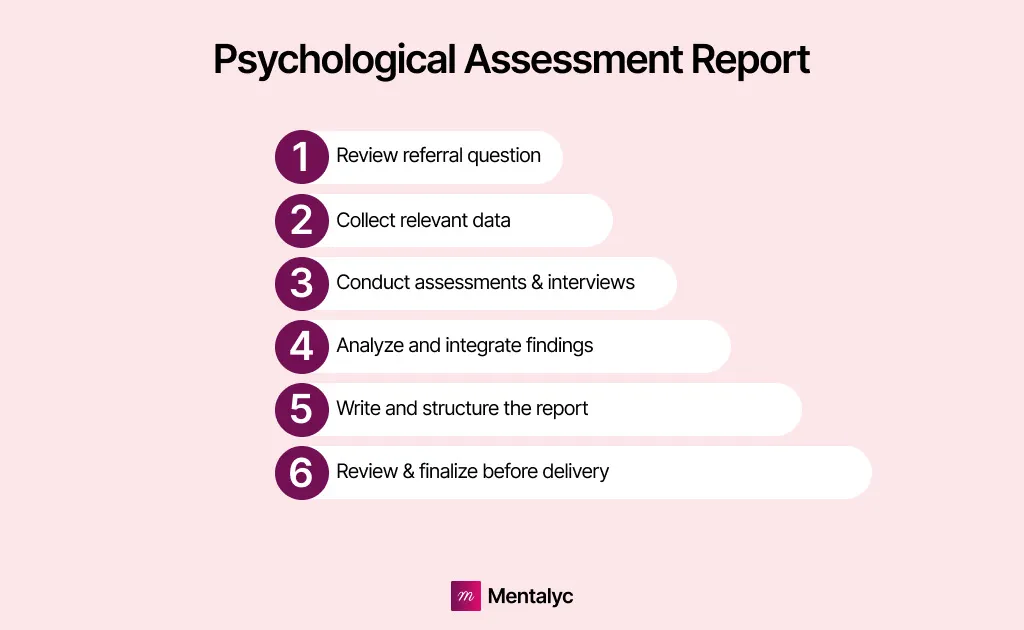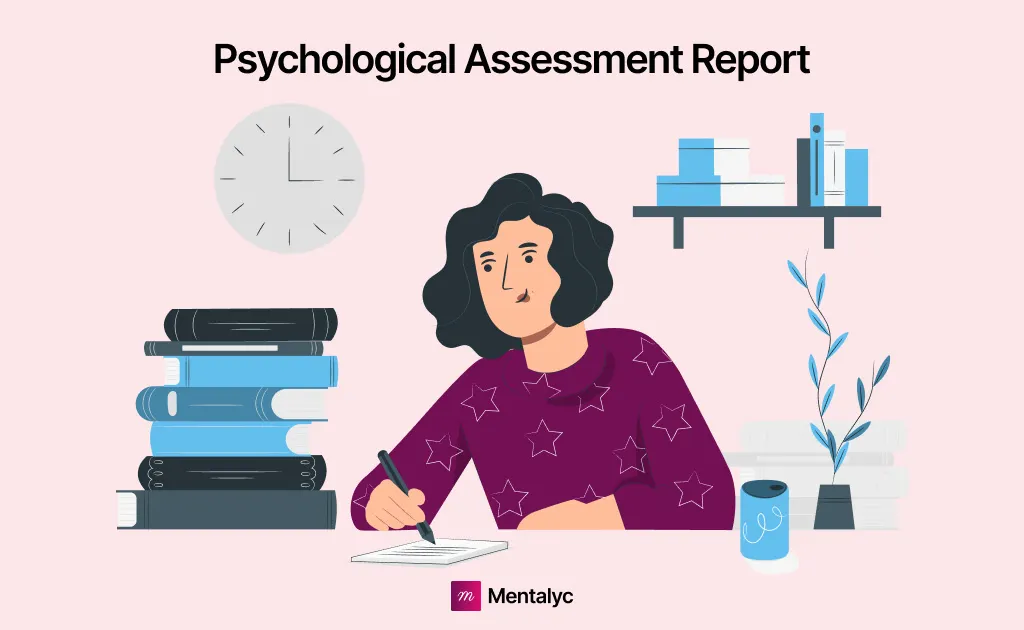A Therapist’s Guide to Crafting Useful Psychological Assessment Reports
As therapists, we know that psychological assessment reports should do more than summarize findings. They need to tell a story, inform treatment, and empower clients and caregivers with clarity and direction. But with limited time and full caseload, it can get hard sometimes.
This guide will help you create **psychological assessments** that are clear, actionable, and meaningful in a timely manner. You’ll learn how to structure findings, communicate results effectively, and turn data into recommendations that truly support growth. Moreover, with the right solution like Mentalyc, you can organize complex findings into accurate, defensible notes. Connecting assessments to measurable progress trends – all in minutes, not hours.
Get ready to take your reporting skills to new heights and help your clients achieve their goals.
Understanding Psychological Assessment Reports
Psychological assessment reports are an essential tool for mental health professionals. They comprehensively overview a client’s psychological health evaluation, incorporating interviews, observations, and psychometric testing information. These tests include personality inventories, intelligence tests, and symptom checklists to give a complete understanding of a client’s symptoms, strengths, limitations, and mental status.
| Test Name | Type | Purpose / What It Measures |
| WAIS-IV (Wechsler Adult Intelligence Scale) | Cognitive | Measures overall intellectual ability, processing speed, and working memory. |
| MMPI-2 (Minnesota Multiphasic Personality Inventory) | Personality | Evaluates personality traits and psychological disorders for diagnostic clarity. |
| BDI-II (Beck Depression Inventory) | Symptom | Assesses severity of depressive symptoms to guide treatment planning. |
| BAI (Beck Anxiety Inventory) | Symptom | Measures anxiety levels and monitors progress during therapy. |
| PAI (Personality Assessment Inventory) | Clinical / Personality | Offers insight into emotional functioning and interpersonal patterns. |
| Conners-4 | Behavioral | Identifies ADHD symptoms and related behavioral concerns in children and adolescents. |
A psychological evaluation report summarizes the assessment process, findings, diagnosis, and treatment recommendations. It helps guide mental health professionals in providing suitable care for their clients. These reports can have a profound impact, so it is essential to be thorough and thoughtful and help clients sensitively and ethically.
Clients often request psychological evaluations when they need an official diagnosis to receive services or accommodations. Moreover, the reports serve clients and their families, schools, employers, insurance companies, government agencies, and the legal system. Therefore, a well-prepared report can have far-reaching effects in various areas of a client’s life.
Pulling together interviews, observations, test scores, and recommendations often takes hours, and updating them as clients make progress adds even more.
This is where Mentalyc can make a difference. The platform helps you turn your session notes and recordings into clear summaries that can be adapted into full psychological assessment reports. With built-in progress tracking, you can also update reports easily, showing changes in symptoms over time.
Components of a Comprehensive Psychological Assessment Report
| Section | Description | Purpose/Focus |
| Referral Information | Includes who referred the client, reason for referral, and key questions to be answered. | Establishes the context and purpose of the assessment. |
| Background Information | Summarizes relevant personal, medical, educational, occupational, and family history. | Provides background to interpret assessment results accurately. |
| Assessment Procedures | Lists all tests and instruments administered (e.g., intelligence, personality, behavioral). | Ensures transparency and reproducibility of assessment. |
| Test Results and Interpretation | Presents scores, qualitative observations, and test interpretations. | Highlights cognitive, emotional, or behavioral functioning patterns. |
| Diagnostic Impressions | States clinical diagnoses or hypotheses based on assessment data. | Integrates findings into a cohesive diagnostic formulation. |
| Treatment Recommendations | Suggests evidence-based interventions, therapy plans, or referrals. | Guides next steps for treatment and support. |
| Summary and Conclusions | Offers a concise overview of findings and implications. | Helps stakeholders quickly understand outcomes. |
| Limitations and Ethical Considerations | Notes potential test limitations or contextual factors affecting results. | Promotes ethical transparency and professional integrity. |
The Purpose and Importance of Psychological Assessment Reports for Mental Health Professionals
Assessment reports are a crucial tool for mental health professionals. They assist in identifying mental health conditions and other issues affecting clients’ thoughts, feelings, and behaviors. This information is essential in guiding diagnosis and treatment and improving treatment outcomes. Assessment reports also help to identify strengths and weaknesses and provide evidence-based data to support clinical impressions. The primary goal of psychological assessment reports is to gain insight into a client’s mental health and well-being to guide effective treatment. Moreover, they are critical for maintaining continuity of care if the client sees other providers.
Platforms like Mentalyc support the assessment process by automatically capturing key clinical details from each session – such as client symptoms, themes, etc.
Additionally, psychological assessment reports can:
- Outline referral questions and the data gathered to answer them
- Integrate information from clinical interviews, observations, and psychometric testing for therapists
- Communicate findings and recommendations to guide treatment in a concise yet comprehensive way
Mental health professionals request psychometric testing and reports for several reasons, including:
- Assisting with diagnosis of psychiatric disorders or learning disabilities
- Understanding a client’s mental health or learning needs
- Determining appropriate placement or services for a client
- Measuring treatment progress and outcomes over time
How to Write a Comprehensive Psychological Assessment Report

As a therapist, conducting psychological assessments and producing clear reports is crucial to your job. To ensure that the reports you generate are valuable, it is essential to have a comprehensive understanding of the referral’s context. You should determine the necessary information, gather data from multiple sources, integrate the findings cohesively, and communicate the results sensitively and clearly. Your reports should include various elements such as background information, reason for referral, procedures used, clinical impressions, diagnosis, and recommendations. These reports can be invaluable tools for clients and clinicians when done well.
To write and conduct psychological assessments thoroughly and communicate your findings accurately, follow these steps:
- Review the referral question and background information. Understand why the evaluation was requested and what specific questions you must answer.
- Determine what data needs to be collected. Select appropriate tests, interviews, and observations to gather information relevant to the referral questions. Make sure you have enough data to support your conclusions.
- Administer assessments, conduct clinical interviews, and observe the patient. Score and interpret the results to identify patterns and themes.
- Analyze and integrate the data. Look for consistencies and inconsistencies across sources. Determine interpretations that can comprehensively answer the referral questions.
- Write your report in a clear, concise, and objective manner. Summarize background information, assessment procedures, results, interpretations, and recommendations. Provide specific examples to support your conclusions.
- Review and proofread your report before distributing it. This ensures your report is logically organized, typo-free, and professionally written. Make sure your interpretations and recommendations follow from the data presented.
Using a therapist psychological report template can streamline this process and ensure consistency and clarity across client reports.
The Benefits and Limitations of Psychological Assessment Reports
Psychological assessment reports can be incredibly beneficial for both clients and clinicians. However, it is essential to remember that these reports have limitations and should only be used when their benefits outweigh the drawbacks for a particular situation. When used correctly, these reports can be invaluable in maximizing a client’s well-being. It is important to note that assessment reports only provide a snapshot in time and may not consider contextual factors. Therefore, we recommend using psychological evaluation reports with other assessment tools and interpreting the results cautiously.
Benefits of Psychological Assessment Reports for Therapists and Clients
Gain a deeper understanding
Psychometric tests and clinical interviews allow psychologists to critically evaluate a client’s cognitive abilities, personality, behavior, and mental health. This results in a fuller picture of the client’s condition, struggles, strengths, and weaknesses.
Improve diagnosis and treatment
With a more complete view of the client, psychologists can determine appropriate diagnoses and craft tailored treatment plans. This leads to better outcomes and a higher chance of success.
Address non-medical issues
Psychological assessments uncover issues beyond just diagnosable mental health conditions. They can reveal learning disabilities, giftedness, poor coping strategies, trauma, relationship difficulties, and more. Identifying these areas allows for targeted support and intervention.
Limitations in Assessment Reporting
Time-consuming
Conducting interviews, administering tests, scoring, interpreting results, and writing reports requires a significant time commitment from psychologists. This can reduce the availability of actual treatment.
Expense
Psychological assessments, especially full batteries of tests, can be costly for clients to obtain. Insurance coverage varies significantly, and many people pay large portions out-of-pocket.
Imperfect tools
While psychometric tests aim to be objective, they still have flaws and biases. Cultural differences, language barriers, and other factors can influence scores and interpretations.
Limited usefulness.
Psychological assessments may provide little additional information or benefit for some referral questions or diagnoses. Clinicians must determine if evaluations are essential and helpful for each client.
Best Practices for Writing Useful Psychological Assessment Reports
Before diving into specific writing practices, it’s worth noting that the process doesn’t have to be overwhelming. Mentalyc can make it easier by transforming your session recordings and notes into clear, structured summaries.
Creating comprehensive and concise psychological assessment reports is one of your most critical tasks as a therapist. To achieve this, you should follow best practices that maintain objectivity while empathizing with the individual’s situation. By doing so, you can develop a detailed and thorough report that helps you create a customized treatment plan for each client based on their specific needs. This personalized approach can be instrumental in helping clients achieve their goals and improving their overall well-being.
Here are some best practices to keep in mind:
- Determine the purpose and goals of the assessment
- Choose reliable, valid, and appropriate assessments for the client’s age, background, and needs
- Explain the evaluation process to the client and obtain proper consent before testing
- Follow standardized procedures for the tests to ensure accurate results
- Score and interpret the test results objectively according to the manuals
- Look for patterns across measures that point to diagnoses, traits, abilities, or disabilities
- Consider the client’s unique circumstances and how that may impact the results
- Write a report that addresses the initial questions and provides background, test details, results, diagnoses, and recommendations. Reviewing a clinical assessment report example can help you structure and present your findings clearly
- Use precise language and avoid excessive jargon
- Present limitations and alternative hypotheses
- Maintain confidentiality and obtain client consent before releasing the report to others
- Be available to answer questions about your methods and findings or recommendations
- Regularly review and update your assessment tools and procedures to provide the best service to your clients
Using Technology (e.g., Mentalyc) for Efficient Report Writing
Writing psychological assessment reports can be time-consuming, especially when turning session notes into clear, structured insights. Modern therapy documentation tools make this process more efficient without compromising clinical quality.
Solutions like Mentalyc automatically organize your session notes into professional summaries, helping you save time while maintaining accuracy and empathy. This lets you focus more on interpretation and treatment planning rather than manual documentation – making report writing faster, clearer, and more consistent.
Template and Example of a Comprehensive Psychological Assessment Report
The following is an overview of a comprehensive psychological assessment report. The level of detail and content will vary depending on the client and the specific questions being addressed. Generally, an assessment report includes the following sections, which can be easily adapted using a psychological report template for therapists:
Referral Information in Assessment Reports
This includes details about who referred the client, the reason for the referral, and the questions to be addressed. For example:
- Referred by Dr. Jane Doe, Licensed Clinical Social Worker, for assessment of attention and concentration difficulties.
Background Information
This area provides relevant details about the client’s background, medical and mental health history, family history, education, work experience, relationships, substance use, legal issues, etc. For example:
- 32-year-old male, married with two children. Graduated college with a Bachelor’s degree. Currently employed as an accountant. No significant medical or mental health issues were reported. Denies substance use.
Assessment Procedures and Results
This section outlines the specific assessments administered, including cognitive, personality, behavioral, and symptom-focused measures. Provide scores, interpretations, and implications. For example:
- The Wechsler Adult Intelligence Scale (WAIS-IV) was administered to assess intellectual functioning. Scores were in the Average range overall. Processing speed was a relative weakness.
Diagnostic Impressions
This section provides the evaluator’s clinical impressions, diagnoses (if applicable), and level of functioning. For example:
- Attention Deficit Hyperactivity Disorder, predominantly inattentive presentation. The client exhibits difficulty sustaining attention and concentration, forgetfulness, and restlessness. Symptoms result in mild impairment in occupational functioning.
Treatment Recommendations
This section provides recommendations to address the client’s symptoms and improve functioning. For example:
- Recommend a trial of stimulant medication to improve attention and concentration. Also, recommend weekly psychotherapy to help develop coping strategies and routines.
Conclusion and Next Steps in Psychological Reporting
Crafting accurate and sensitive psychological assessment reports is a challenge, but with dedication, practice, and attention to detail, you can become skilled at creating valuable insights for your clients. Remember that it’s a process that requires patience, and always prioritize ethical standards and client confidentiality. Following the tips and guidelines outlined in this article ensures that your reports are efficient, informative, and beneficial for the client’s overall mental health journey.
Take the next step and enhance your practice with Mentalyc. Mentalyc automatically turns session data into structured, HIPAA-compliant, and clinically accurate & audit-ready documentation – saving you hours while ensuring consistency and professionalism. Start your free trial today.
Mentalyc Plans & Pricing
| Plan | Price | Key Features |
| 14-Day Free Trial | $0 | 14 days of full PRO access, including 15 notes—no credit card required. |
| Mini | USD 14.99 /month | Record in-person sessions, upload audio files, use voice- to-text, or type notes directly, etc |
| Basic | USD 29.99 /month | Everything in Mini, plus: Alliance Genie™NEW! (limited access), Smart TP™ |
| Pro | USD 59.99 /month | EMDR, Play and Psychiatry modalities, 100+ custom templates incld. BIRP, PIRP, GIRP, PIE, and SIRP, Auto-computed CPT codes |
| Super | USD 99.99 /month | Everything in Pro, plus: Group therapy notes for each group member, Priority onboarding and support |
For more information, visit the pricing page on our website.
Frequently Asked Questions (FAQs) About Psychological Assessment Reports
As a therapist, you likely get many questions about psychological assessment reports from colleagues, clients, and others. Here are some of the most common FAQs and your answers:
Why do people request psychometric testing and assessment reports?
People request psychometric testing and reports for many reasons, including:
- Diagnosing a mental health condition like depression, anxiety, ADHD, etc.
- Determining eligibility for special education services or workplace accommodations
- Gaining insight into strengths, weaknesses, and personality to aid career or relationship counseling
- Assessing risk factors for conditions like substance abuse or recidivism in the criminal justice system
Who are psychological assessment reports for?
Assessment reports are written for the referral source, a physician, school, employer, or court. They aim to provide recommendations to assist these parties in determining diagnosis, treatment, eligibility for services, risk, etc. Clients and families may also benefit from understanding the results and recommendations.
What psychological tests are commonly used in assessments?
- Intelligence tests like WAIS and WISC
- Achievement tests like WIAT and WRAT
- Projective tests like Rorschach and TAT
- Neuropsychological tests for memory, processing speed, executive function, and more
- Personality tests like MMPI, 16PF, and NEO-PI
What are the benefits and limitations of psychological assessment reports?
Benefits include gaining objective data to support diagnosis and recommendations. However, test results can be misinterpreted or misused. Cultural and diversity factors may also limit generalizability. No assessment is 100% accurate, so clinical judgment is also needed.
How long does a psychological assessment typically take?
Psychological assessments generally require several hours for test administration, scoring, interpretation, and report writing. The entire assessment process usually takes between 4 and 12 hours, depending on the number of tests administered and the complexity of the referral question.
How accurate are psychological assessments?
While psychological assessments provide objective data, they have limitations. Test scores approximate a person’s abilities, personality, and condition. The accuracy depends on several factors, including the tests’ quality, the client’s effort and willingness to share honestly, and the interpreter’s skill and experience. Overall accuracy rates range from about 70% to 95% for most psychological assessments.
How is psychological testing used in assessment report writing?
Psychological testing is utilized to evaluate an individual’s cognitive abilities, personality traits, emotional well-being, and behavioral characteristics, which are then documented in the assessment report.
What should be included in a psychological report?
A psychological report typically includes an overview of the individual’s background, test results, interpretation of scores, diagnostic impressions, and recommendations for treatment or intervention.
What are the key components of a cognitive assessment report?
The key components of a cognitive assessment report include an analysis of cognitive skills such as attention, memory, problem-solving, and reasoning abilities, along with interpretations of standardized test scores in these areas.
How can psychological consultation enhance the report-writing process?
Psychological consultation can provide valuable insights and perspectives to ensure that the assessment report is well-rounded, comprehensive, and effectively communicates the psychological findings and implications for the individual.
What is the importance of understanding psychological reports?
Understanding psychological reports is crucial for clinicians, educators, and other professionals to appropriately interpret and utilize the information for decision-making, intervention planning, and providing support to individuals based on their psychological needs.
What is the role of a neuropsychologist in psychological assessment report writing?
A neuropsychologist plays a key role in conducting formal psychological and neuropsychological assessments, interpreting test results related to cognitive functioning, and providing valuable insights into an individual’s cognitive and emotional strengths and vulnerabilities.
How are standardized tests utilized in psychological assessment reports?
Standardized tests are used to measure an individual’s performance in various domains such as cognitive abilities, emotional functioning, adaptive skills, and interpersonal relationships, providing quantitative data for inclusion in the psychological report.
What is the process of editing a psychological assessment report?
The process of editing a psychological assessment report involves reviewing and refining the content to ensure clarity, accuracy, and appropriateness of language, as well as adherence to professional guidelines and ethical standards.
How can cultural context be considered in the interpretation of psychological assessment reports?
Cultural context should be taken into account when interpreting psychological assessment reports to ensure that the assessment process and the report accurately reflect the individual’s cultural background, values, and experiences.
References:
- American Psychological Association. (2013, November 10). Understanding Psychological Testing and Assessment. https://www.apa.org/topics/testing-assessment-measurement/understanding
- Black, A. (2021, August 11).Common questions about psychological assessments. PsychMed. https://psychmed.com.au/common-questions-about-psychological-assessments/
- Bright Pine Behavioral Health. (2023, May 4).Psychological Testing Report Example. https://www.brightpinepsychology.com/example/
- Farley, J. L. (2023, October 9). Psychological Assessment: What is it and Why is it Important? Lindner Center of HOPE. https://lindnercenterofhope.org/blog/psychological-assessment-what-is-it-and-how-can-it-help/
- Fernández-Ballesteros, R. (n.d.).Psychological Assessment. Science Direct. https://www.sciencedirect.com/topics/psychology/psychological-assessment
- Ferraro, K. (2022, March 16). 5 Pros of Psychological Tests, Plus 2 Cons. LiveStrong. https://www.livestrong.com/article/78802-advantages-psychological-tests/
- Huff, C. (2020, March 1). How to Write More Useful Assessment Reports. https://www.apa.org. https://www.apa.org/monitor/2020/03/career-write-reports
- New Vision Psychology. (2023, June 8). Understanding Psychological Reports and Assessments. https://newvisionpsychology.com.au/psychological-assessments-and-reporting/things-you-should-know/
Disclaimer
All examples of mental health documentation are fictional and for informational purposes only.
Why other mental health professionals love Mentalyc

“It helps align the note and the plan for moving forward with sessions … it’s been a really good aid in giving me direction.”
LPC

“I go back and can read the notes, and it really helps me for the next session. It has made me a much better counselor.”
Licensed Professional Counselor

“I benefit tremendously every time I wrap up a session and then a few minutes later, I have this AI note. It makes me a better clinician in a variety of ways.”
LPC

“It improves the quality of my work as I review my sessions … I bring a sense of continuity from session to session because of the really good summary and progress notes that Mentalyc gives me.”
Licensed Marriage and Family Therapist




